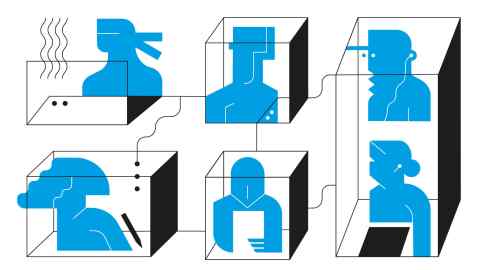The admin-encrusted, leading-hefty superstructure of contemporary small business helps make a plump and engaging concentrate on. Gary Hamel, the motor-mouthed administration thinker, has been shooting at it for a long time. But he is no mere iconoclast. He has also tried using to resolve the central predicament of organisations — how to balance necessary composition with creative chaos — through initiatives such as his Management Lab, which will come up with collaborative alternatives to administration complications.
“The common medium- or substantial-scale organisation infantilises staff, enforces uninteresting conformity, and discourages entrepreneurship it wedges persons into slim roles, stymies own advancement, and treats human beings as mere assets,” he and Management Lab co-founder Michele Zanini write in Humanocracy, released this year. Even sceptics will concur wholeheartedly with Laurence Peter, co-writer of The Peter Principle: “Bureaucracy defends the standing quo lengthy earlier the time the quo has misplaced its standing.”
When Hamel and Zanini tackled the paperwork issue in a 2016 paper, they tried using to measure the “bureaucratic drag” on the US financial state and identified as the reward for eradicating it “the $3tn prize”. Extrapolating these calculations to the relaxation of the globe, they now estimate clearing out world bureaucratic waste would add a suspiciously neat $10tn to total output — a sum essential far more than at any time as economies struggle with the outcomes of the pandemic.
The heroes of their narrative are organisations currently familiar to followers of progressive administration wondering: Buurtzorg is a Dutch service provider of household health solutions which is organised into self-controlling groups Early morning Star is a Californian tomato processor without the need of administrators which arranges operate around contracts involving colleagues. Inevitably, Southwest Airways, whose cheerful staff have the independence to imagine and act like entrepreneurs, is authorized a fly-earlier.
The struggle from paperwork will become far more exciting when it is taken to substantial, and seemingly common, firms. Hamel has lengthy suggested big is stunning only when substantial companies be successful in decentralising and breaking them selves into many lesser units whose group users have the energy to take decisions.
For instance, Vinci, a French building and concession corporation with 221,000 staff, has break up alone into three,000 specialised small business units. Haier, a Chinese white items manufacturer, has long gone even further, replacing a common leading-down administration product with an formidable and occasionally perplexing program of 4,000 “microenterprises” with the independence to innovate and contend from each other for staff and money.
Then there is Michelin. I wrote about the French multinational’s “responsabilisation” challenge — which delegates selection-producing energy to front-line personnel — in 2017, when it was about to roll it out across the team. By the starting of this year, according to Hamel and Zanini, the challenge was “on system to deliver a 50 percent-billion dollars’ worth of production improvements”.
The teachable lesson in this article is that even substantial, complicated companies can take ways toward getting to be meritocratic communities of self-directed small groups. And the spend-off is not just fiscal: personnel with far more accountability are happier and far more engaged. Not only is this radical change feasible, but Hamel and Zanini give the instruments to commence it. They have devised a questionnaire to assistance executives measure the BMI — paperwork mass index — of their own organisations.
This gospel will uncover keen disciples between weary administrators and personnel at soulless megacorps, struggling “a Monday through Friday variety of dying”, in the text of Studs Terkel, the wonderful chronicler of day-to-day operate.
But even these dedicated to the race for the $10tn prize should accept paperwork has its takes advantage of. It commences as a framework to preserve efficiency and can hold again the tide of dysfunction that threatens to overwhelm improperly run firms. The problem, then, even for formidable commence-ups, is how a lot composition to impose. As well a lot and the entrepreneurial spirit withers. “The fuel that feeds the advancement of paperwork is the quest for own energy,” Hamel and Zanini write, accurately. Devoid of any framework or course of action, nevertheless, a freewheeling lifestyle can go rotten as an organisation grows.
What impact may possibly the existing crisis have on the administration revolution that Hamel has been cheering all his vocation? It could be a catalyst for better adjust, as companies are compelled to handle far more remote personnel in distinct techniques. But the dysfunction forward could also encourage some company chiefs to shore up their fortress of centralised administrative energy.
It would be a pity if the slow-to-ebb virus and the advancing economic downturn were to deter would-be humanocrats from pursuing radical transformation. But it would be understandable. Immediately after all, administration experimentation entails having challenges. The central problem, as Hamel and Zanini stage out in their reserve, is that “if you’re a supervisor of any sort, you can’t empower other individuals without the need of surrendering some of your possess positional authority”.






More Stories
Business Solutions to Peoples’ Needs
eFoods Global Business Opportunity Review – Emergency Food For Long Term Storage
Sustainable Startup Business Ideas